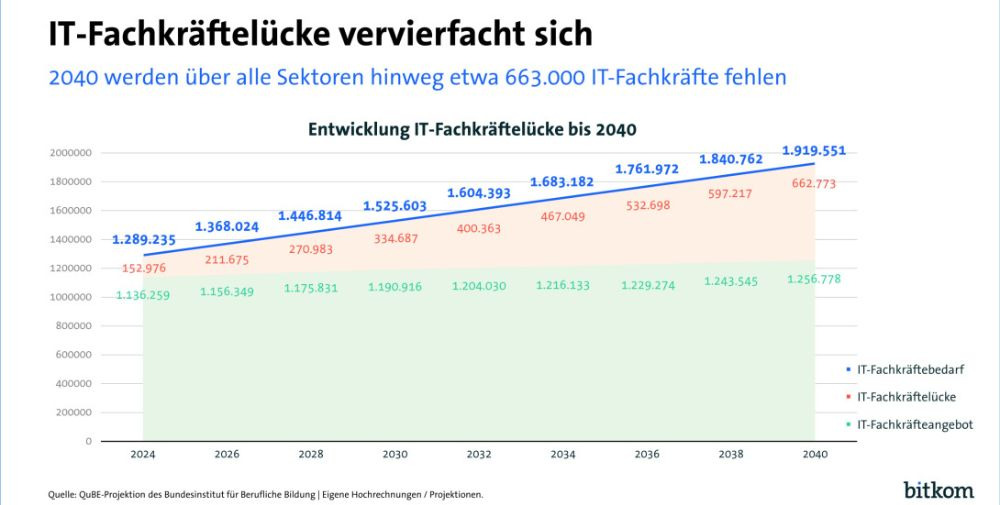
“The shortage of IT specialists, which has been worsening for years, affects the entire country and is slowing down the urgently needed digitalization. An ever-increasing skills gap in IT means a loss of competitiveness, value creation, growth and prosperity. Without IT specialists, Germany is gambling away its digital future,” says Bitkom President Dr. Ralf Wintergerst. “The good news is that if we act consistently now, this projection does not have to become reality. What is necessary is that the right measures are introduced in all areas at the same time.” According to Bitkom’s calculations, the looming skills gap can only be closed if massive countermeasures are taken immediately. For example, around 129,500 additional IT specialists could be recruited by 2040 by promoting lateral entry, around 108,000 more could be added through measures in the area of studies and training and 68,500 could be activated by older employees staying in work longer. In Bitkom’s view, it is essential to attract a further 321,000 IT experts to Germany by improving immigration opportunities. Wintergerst: “If we make an extreme effort, we can close about half of the foreseeable skills gap from within Germany. The other half, however, urgently needs qualified immigration from all parts of the world.”
According to the calculations, the supply of IT specialists will increase slightly by around 120,000 from the current 1.136 million to 1.256 million by 2040 – provided the corresponding measures are continued at the current level. The comparatively low average age in the IT professions also plays a role here. While 50.5 percent of current employees in the economy as a whole will retire by 2040, this figure is only 32.5 percent in the IT professions. “However, this initially positive starting position also means that the demographic trend will hit IT all the harder after 2040. This makes it all the more important that we set the course now and successfully take countermeasures,” says Wintergerst. At the same time, the demand for IT specialists in the economy will increase rapidly by 2040. While it currently stands at 1.29 million, it will then be 1.92 million. That is an increase of around 630,000.
Getting young people excited about IT, improving studies and training
Educational policy measures such as a compulsory subject in IT, more cooperation between schools and industry and additional IT professorships could stabilize and further increase the recent rise in interest in IT professions. According to Bitkom, this could lead to the recruitment of around 27,000 additional IT specialists by 2040. Particular attention should be paid to girls and women. Currently, only around 21% of students and 10% of trainees in the field of IT are female. Wintergerst: “There is no real reason why just as many women should not aspire to and enter an IT profession as men.” If the proportion of women among those who complete their studies and training were increased to 50 percent, an additional 25,500 IT specialists could be available by 2040. Another starting point in the area of studies is to reduce the drop-out rate in computer science courses, which at 42% is significantly higher than the average for all courses, which is currently 27%. If the dropout rate were reduced to 20 percent, around 55,000 more highly qualified IT specialists could be recruited in Germany by 2040.
Keeping older employees in the labor market
At the same time, around 68,500 more IT specialists could be available by 2040 if older employees voluntarily remained in the labor market beyond retirement age. Currently, just 0.9 percent of IT employees are 65 years old or older. In order to increase this proportion, financial incentives are needed for companies and employees alike, while social security contributions for employees of retirement age should be completely abolished or at least significantly reduced. “IT often offers working conditions that make it possible to work in old age and many employees would also like to work longer. However, working beyond the age of 65 is often not attractive for either companies or employees,” says Wintergerst. “The companies themselves are called upon to continuously train older employees – and we need to develop a culture in tech companies that are particularly youth-oriented, which sees older employees as an important part of diversity and also lives this.”
Further facilitating lateral entry into IT
IT already offers ideal conditions for lateral entry today; around a quarter of all skilled workers in the IT sector are lateral entrants. According to Bitkom’s calculations, the number of career changers can be increased by 50 percent through concrete measures such as the promotion of lateral entry programs and boot camps as well as the expansion of advisory services, which corresponds to around 129,500 additional skilled workers. “Flexibility and creativity are important. For example, in line with the part-time education model, people who want to move into IT, but also into other professions with shortages, should receive targeted financial support. But companies themselves must also invest in their future and massively expand further training and qualification measures for both active and potential employees,” says Wintergerst.
Skills gap can only be closed with immigration
However, even if all these measures take effect, there will still be a gap of around 357,000 missing IT specialists in 2040. Recently, around 13,000 foreign skilled workers from the EU and other countries have been immigrating to IT professions every year. As a result of the new Skilled Immigration Act, the German government wants 75,000 additional skilled workers from third countries outside the EU to come to Germany each year; in terms of IT professions, that would be 4,000 per year. A similar increase must also be achieved for EU countries. “We will not be able to close the IT skills gap with the domestic potential and immigration to date. Germany must become much more attractive as a place to work and live for IT specialists,” says Wintergerst. “These people are being courted worldwide. For us to be attractive to them, Germany must remain an open, tolerant and free society. Xenophilia instead of xenophobia, that’s what it’s all about.” Bitkom advocates transforming immigration authorities into welcome agencies, strengthening international marketing for Germany as an IT location and significantly reducing bureaucracy and speeding up immigration, for example by comprehensively digitalizing procedures. According to Bitkom’s calculations, a total of around 321,000 additional skilled workers from third countries and the EU could come to Germany by 2040.
If all measures are tackled in the short term, the skills gap in IT could be reduced to around 35,800 by 2040. “Digitalization needs technology, but above all it needs people to drive it forward,” says Wintergerst. “The skills shortage is not a natural phenomenon. We don’t have to wait for anyone or hope for anything, we have to take action ourselves. We have been discussing the skills shortage in IT for years and launching individual projects. What is missing is an ambitious overall strategy. It must come now.”
– – – – – –
Further links
👉 www.bitkom.org
👉 Presentation: IT specialists 2040: Where does the German economy stand?
Graphic: Bitkom




